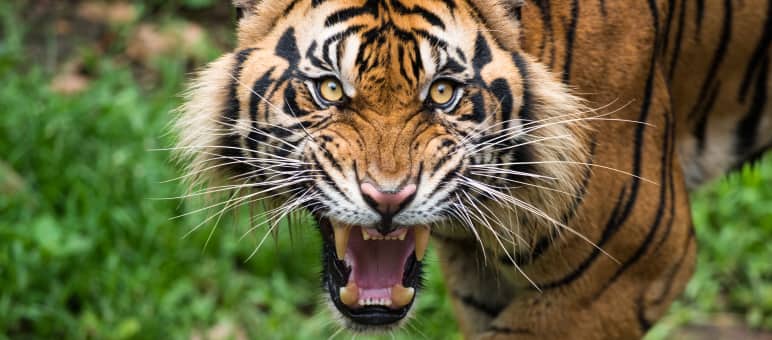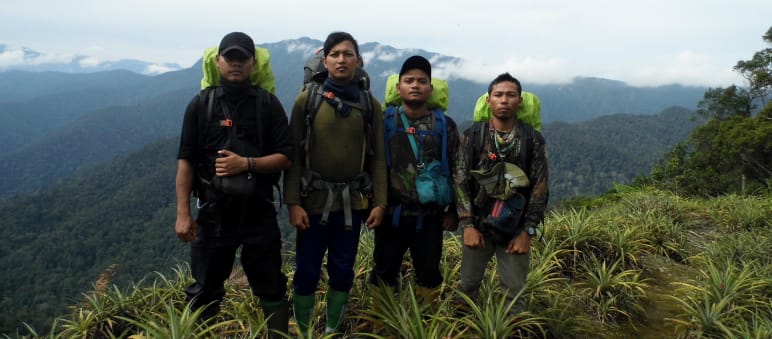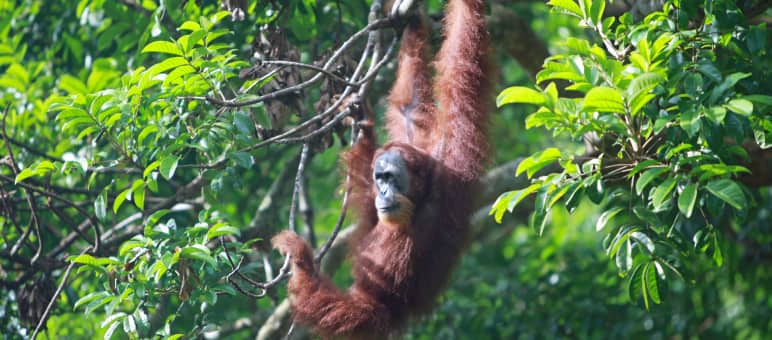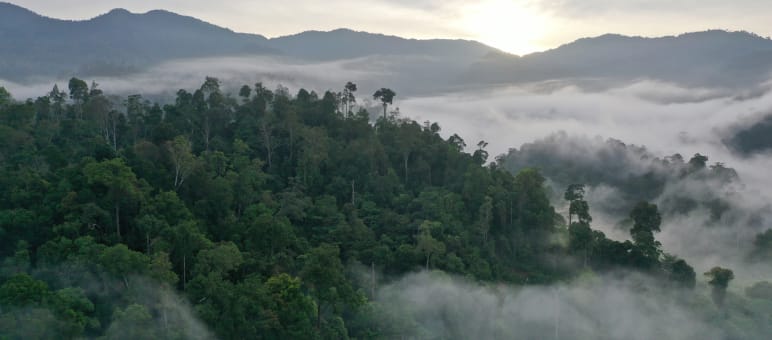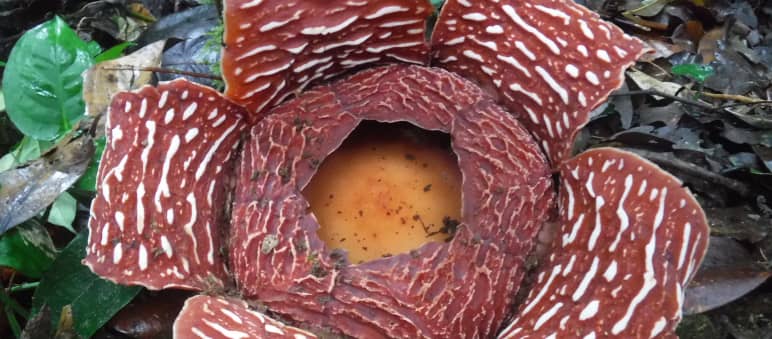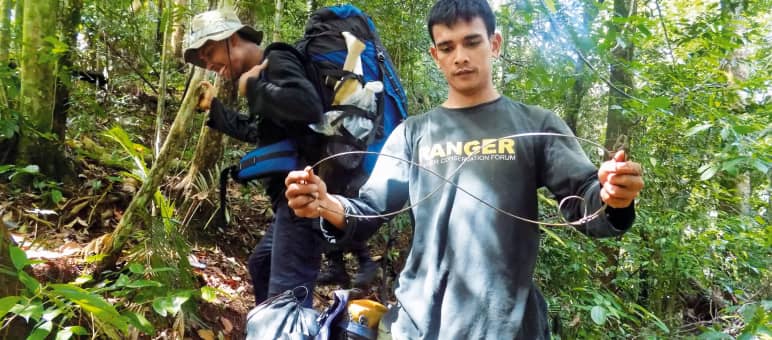Leuser: a refuge for orangutans, tigers, rhinos and elephants
A thousand wildlife sightings in a single year. Twenty-seven tiger traps dismantled. One forest holding the last hope for Southeast Asia’s rarest species. Explore the frontlines where conservation isn’t a choice: For our partner Forum Konservasi Leuser, it’s a race against time.
Project Overview
Project FocusWildlife
Project Objective Stop deforestation in the Leuser Ecosystem; stop poaching; protect wildlife
Activities Equip two ranger teams of five people each in the area from the Tripa swamps to the Gayo highlands
The team of five rangers roams the forest with the eyes of trackers. They are trained to notice any change – footprints, snapped twigs, cigarette butts. Not to mention traps for elephants, wire snares for tigers and sun bears and drag marks from logs.
Their workplace: one of the most magnificent rainforest areas, the Leuser Ecosystem – the last place on our planet where tigers, elephants, rhinos and orangutans share a habitat.
A patrol through the jungle lasts two full weeks. The rangers from our partner Forum Konservasi Leuser (FKL) can then return to their camp or village for a rest. Their work is exhausting and requires great personal sacrifice. The men are out in nature almost all year round, equipped with backpacks, tents and GPS devices. “Last year, we undertook 29 patrols. We were in the field for a total of 317 days,” they tell us.
The rangers’ mission includes destroying poachers’ camps and oil palm plantations and documenting logging and sightings of wild animals. “Last year, we dismantled 27 snares for tigers, deer and porcupines. In another 30 cases we prevented poaching. We also found ten poaching camps and reported five illegal trails.”
The rangers also observe that the forest in Sumatra is full of life, having recorded more than a thousand wildlife sightings. They are especially pleased with the numerous sightings of highly endangered megafauna: 278 tigers, 85 orangutans and 24 elephants. In addition, there are Sumatran serows, wild boars and deer. “We had almost twice as many sightings as in previous years,” said FKL Director Muhammad Isa. “This means that the Leuser Ecosystem is still a good habitat for endangered wildlife. We have even come across Sumatran tigers in the mountains at altitudes of more than 2,500 meters.”
Leuser Ecosystem protected area
The Leuser Ecosystem in northern Sumatra is one of the largest and most important protected areas in Indonesia. The Leuser Ecosystem Conservation Area (Kawasan Ekosistem Leuser, KEL) is mostly located in the autonomous province of Aceh and is named after the 3,404-meter mountain Gunung Leuser.
Its coastal landscapes on the Indian Ocean, lowland and montane rainforests, peatlands and swamps are among the most biodiverse in the world. Its rainforests are among the most pristine in Indonesia. 8,500 plant species have been documented, including trees such as meranti, damar and keruing. The world’s largest flower, the rafflesia, also grows here.
Leuser is famous for being the last place on Earth where four iconic mammals – orangutans, the very rare and elusive tigers, critically endangered rhinos and elephants – share the same habitat. At least seven cat species call the Leuser home, including the clouded leopard (Neofelis nebulosa), the Asian golden cat (Felis temmincki) and the marbled cat (Felis marmorata). Other mammals include Indian wild dogs (Cuon alpinus), sun bears (Helarctos malayanus) and Sumatran serows (Capricornis sumatrensis).
Parts of the Leuser Ecosystem have been destroyed for timber, palm oil, roads and mining. The destruction of peat bog forests and mangroves is particularly tragic. The civil war until 2005, the tsunami in December 2004 and the subsequent reconstruction have also inflicted terrible damage.
Our partner – Forum Konservasi Leuser
“We have reached a critical juncture requiring immediate action,” says Muhammad Isa. “The Leuser Ecosystem represents Southeast Asia's richest biodiversity. The megafauna still has a chance to survive here. It’s the last hope for Southeast Asia's biodiversity.”
Major international programs to protect the Leuser Ecosystem have cost a lot of money, but ultimately have little to show for it. The Forum Konservasi Leuser FKL, founded in 2013, takes a different approach and combines close cooperation with affected people, NGOs and authorities with scientifically supported programs for the protection of rhinos and elephants.
There are now 39 ranger teams of five people each, supported and funded by various conservationists. Since 2018, two of the teams supported by Rainforest Rescue have been patrolling in the west of Leuser, where the Gayo mountain range gradually rises from the Tripa swamps. This is a particularly sensitive and previously unmonitored area. The rangers have proven successful in slowing deforestation and curbing poaching.
In addition to the two ranger teams, Rainforest Rescue also supports the reforestation of illegal oil palm plantations, the protection of the Singkil swamps, the forest rights of a village community in the Gayo area and mangrove reforestation on the north coast of the Leuser Ecosystem.
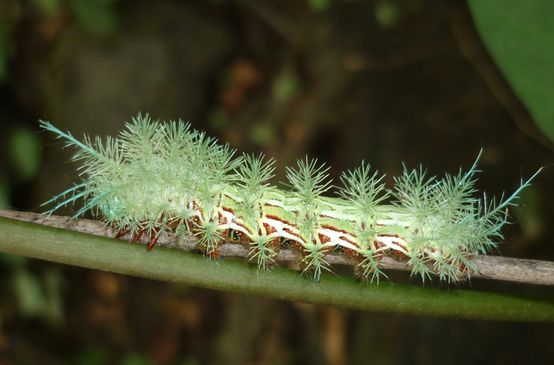
Biodiversity
Life on Earth originated around 4 billion years ago. Since then, an unfathomable number of species have evolved, around half of which are insects. Numerous plant and animal species have yet to be documented, and many new ones are being discovered every day.
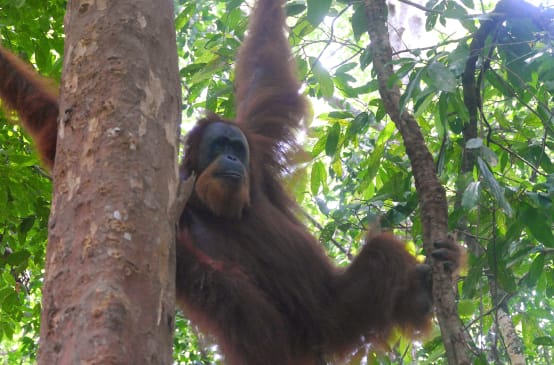
Indonesia: The wild orangutans are back!
Good news from our projects in the Leuser Ecosystem in Sumatra: Orangutans are returning to the reforested areas, and our rangers are curbing poaching.
